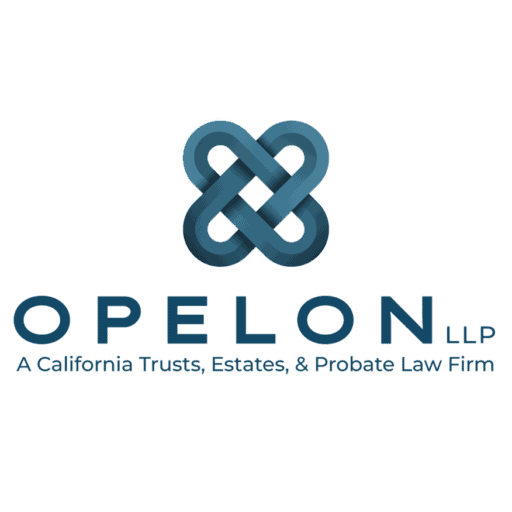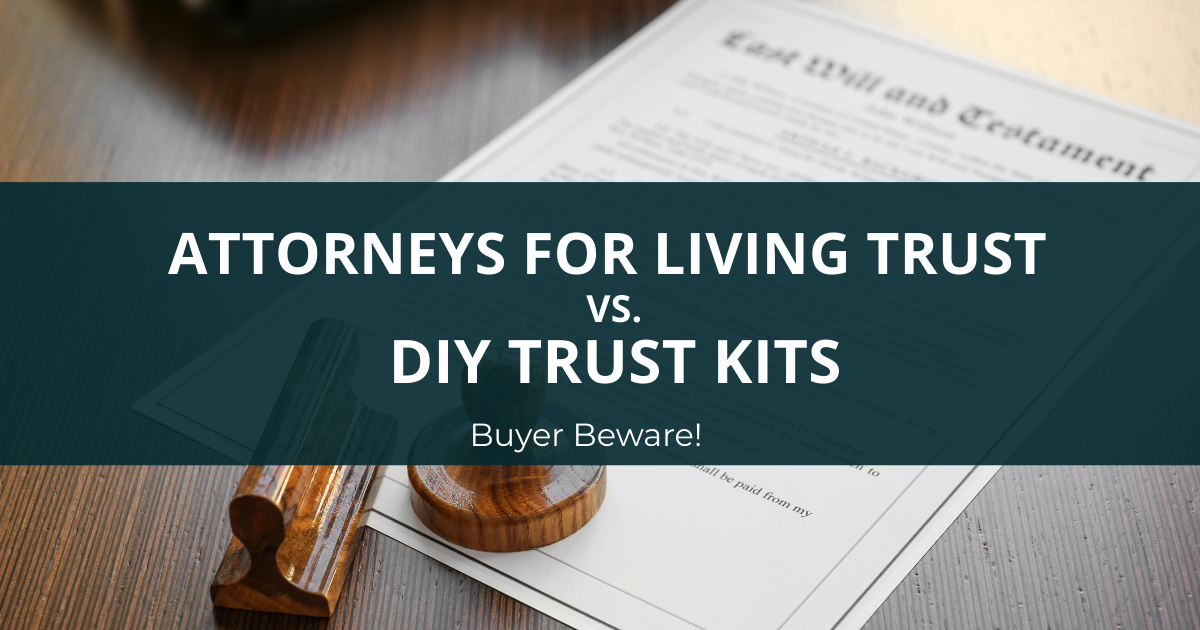Attorneys for Living Trust: 5 Reasons They Beat DIY Kits Every Time
Thinking of skipping the attorney and using a DIY trust kit?
You’re not alone—many California families consider this route when planning their estate. But while DIY estate planning tools promise convenience and savings, they often fall short where it matters most: protecting your family, your assets, and your legacy.
If you’re a San Diego or Carlsbad resident with minor children or real estate, this guide breaks down the real differences between using attorneys for a living trust versus going the DIY route. From legal compliance in California to the hidden risks of online estate planning forms, we’ll show you what’s at stake—and why a living trust attorney is often the smarter long-term choice.
Summary: Using Attorneys for Living Trust vs. DIY Trust Kits
Short answer: DIY trust kits can work for very simple situations, but most California families—especially San Diego and Carlsbad homeowners with minor children—benefit from an attorney’s counsel. Here’s the snapshot:
-
DIY Trust Kits / Online Estate Planning Forms
-
Pros: Low upfront cost, fast, convenient.
-
Cons: One-size-fits-all templates, higher risk of mistakes (especially with real estate and minor children), limited or no funding support, and little guidance on California-specific rules.
-
-
Attorneys for Living Trust
-
Pros: Customized plan, deed preparation and trust funding help, child-focused protections, coordination with beneficiary designations and tax issues, and ongoing advice.
-
Cons: Higher upfront fee than a kit; requires a bit more time and information sharing.
-
Rule of thumb: If you own real estate or have kids under 18, or you want to avoid probate with confidence, talk to attorneys for living trust before you rely on a kit.
What a Living Trust Does in California
A revocable living trust is a legal container for your assets during life and a set of instructions for what happens if you’re incapacitated or after you pass away. In California, that means:
Avoiding Probate: Probate is a court process that can be slow and public. A properly funded living trust lets your successor trustee distribute assets privately, often faster and with less friction.
Incapacity Planning: If you’re ill or injured, your successor trustee can step in to manage trust assets without a court conservatorship.
Protecting Minor Children: Kids can’t legally manage inheritances. A trust allows you to set age-based payouts, education and health provisions, and oversight by a trustee you choose.
Streamlining Real Estate Transfers: Homes in San Diego County (including Carlsbad) can be titled in the trust; after your death, your trustee can transfer or sell property without a court order.
Keeping Things Private: Wills become public in probate; a trust generally doesn’t.
Key terms made simple:
Grantor/Trustor/Settlor: You (the person creating the trust).
Trustee: The person who manages trust assets (often you while alive; then a successor).
Funding: Moving assets into the trust—retitling real estate, updating bank/brokerage accounts, etc. Without funding, even a perfect trust won’t work.
Cost Comparison: DIY Kits vs. Trust Attorneys (What You Really Get)
DIY kits/online forms usually advertise a low one-time price. But it’s crucial to ask what’s included—and what isn’t.
What DIY Typically Includes
A base revocable trust template and a few fill-in schedules.
Sometimes a pour-over will, financial power of attorney, and healthcare directive.
Generic instructions (often not California-specific).
Minimal or no help with funding (retitling accounts, preparing and recording deeds).
What Attorneys for Living Trusts Typically Include
California-specific drafting tailored to your family, property, and goals.
Proper guardian nominations (via will) and trust terms for minor children.
Real estate deeds (grant deed/quitclaim where appropriate), preliminary change of ownership forms, and county recording guidance.
Funding checklists and coordination with financial institutions.
Beneficiary designation review (retirement accounts, life insurance).
Tax-aware planning (community property, property tax considerations, basis planning).
Ongoing advice and updates as life changes.
The Real Cost Picture
DIY risks often show up later: an unfunded trust, a deed that wasn’t recorded, a beneficiary conflict, or a clause that doesn’t fit California law.
Attorney time costs more up front but is aimed at preventing expensive delays, court involvement, or family disputes down the line.
Bottom line: Price the outcome, not just the document. The “cheapest” trust is the one that actually works when your family needs it.
When DIY Estate Planning Fails (Top Risks to Avoid)
DIY can be fine for narrow situations, but these are the most common failure points we see in California:
Unfunded Trusts
People sign the trust but forget to retitle the house or accounts. Result: assets still go through probate.Deed & Title Mistakes
A trust name mismatch, a missing legal description, or a deed that never gets recorded with the county can derail your plan for the San Diego/Carlsbad home.Beneficiary Conflicts
Retirement accounts and life insurance pay by beneficiary designation, not your trust—unless coordinated correctly. DIY kits rarely provide tailored guidance here.Minor Children Left Unprotected
Without detailed trust terms (age-based distributions, education/health standards, trustee powers), kids could receive large sums too early—or face court oversight you didn’t intend.Execution Errors
California has specific rules for signing, notarization, and sometimes witnessing companion documents. Miss a step and your paperwork may be invalid or less effective.Outdated or Non-California Language
Generic templates might skip California-specific considerations (e.g., community property, property tax rules), creating inconsistencies or lost tax benefits.No Plan for Incapacity
A trust without a durable power of attorney and advance healthcare directive leaves gaps; families end up seeking court authority in a crisis.
Pro tip: Even if you start with DIY, consider an attorney for a living trust to review, correct, and fund the plan—especially for real estate and accounts with large balances.
Why Hire Attorneys for Living Trust (Not Just a Kit)
If you’re a San Diego or Carlsbad homeowner or a parent of minor children, here’s what an attorney adds that a template simply can’t.
1) Child-Focused Planning That’s Actually Practical
Guardianship nominations via your will so the right adult can step in.
Trustee selection (and backups) with clear instructions for spending on health, education, activities, and special needs.
Staggered distributions (e.g., partial payouts at set ages) and incentive provisions to promote responsibility.
Trustee safeguards: accounting requirements, co-trustee options, and dispute-resolution language.
2) Real Estate Done Right in San Diego/Carlsbad
Correct deed preparation with full legal description, proper vesting, and trust name consistency.
Guidance on county recording requirements and transfer forms.
Title strategies for community property and married couples, and coordination for rental or vacation homes.
Awareness of property tax considerations and how titling choices can affect future assessments or basis planning.
3) Coordination That Avoids Collisions
Aligning beneficiary designations (IRAs, 401(k)s, life insurance) with your trust instructions.
Integrating business interests, LLC membership units, or equity compensation.
Drafting companion documents—pour-over will, durable financial power of attorney, advance healthcare directive—so there are no gaps if you’re incapacitated.
4) California-Specific Drafting and Updates
Plain-English clauses that fit California community property norms and court expectations.
Built-in flexibility (trustee powers, decanting, trust protector options) to adapt to law changes or family shifts.
A human you can call when life changes: new home, new child, marriage, divorce, or a big move.
Takeaway: Kits produce documents. Attorneys for living trust produce outcomes—a complete, coordinated plan that works in the real world.
Bonus: Estate Planning Checklist
DIY Trust Kits: Use Cases and Limits
There are situations where DIY estate planning or online estate planning forms can be reasonable—just be honest about the limits.
When DIY Might Be Enough
You’re single, have no real estate, modest non-retirement accounts, and no minor children.
Your beneficiaries are adults you trust, with no special circumstances.
You’re comfortable handling funding yourself and double-checking beneficiary forms.
Clear Signs You Should Hire a Living Trust Attorney
You own a home or rental property in California (especially San Diego County).
You have minor children, a blended family, or a beneficiary with special needs or money-management challenges.
You hold significant retirement assets and need guidance on beneficiary designations.
You want to plan for incapacity without court involvement.
You value privacy and speed for your family—and want to avoid probate reliably.
If You Still Choose DIY, Raise Your Standards
Choose a provider with California-specific documents and clear funding instructions.
Make sure you receive (or add) a pour-over will, financial power of attorney, and advance healthcare directive.
Confirm whether deed help is included; if not, budget for a professional to prepare and record it correctly.
Consider paying for a lawyer review of your draft—even a quick check can prevent major issues.
California Requirements: Notaries, Deeds, and Funding (What Matters)
California recognizes revocable living trusts, but the details—how you sign, notarize, and fund—determine whether your plan works.
Signing & Notarization Basics (California-Friendly)
Trust Agreement: Typically signed before a notary by the trust creators (often both spouses).
Pour-Over Will: Signed with the California will formalities (two disinterested witnesses).
Powers of Attorney & Health Care Directive: Commonly notarized; some banks prefer notarization for financial documents.
Witnesses vs. Notary: A trust itself usually needs notarization for real estate funding; the will needs two witnesses. (DIY estate planning kits often blur these lines—don’t.)
Deeds: Getting Your Home Into the Trust
To move your San Diego or Carlsbad property into the trust, you’ll need:
A properly drafted deed (e.g., Grant Deed/Quitclaim) with the full legal description.
Exact trust name and date matching your trust document.
Preliminary Change of Ownership Report (PCOR) and any county-required coversheets.
County recording with the San Diego County Recorder.
Common DIY mistakes: wrong trust name, missing legal description, or never recording the deed at all. An attorney for living trust typically prepares the deed, PCOR, and handles recording or coordinates it for you.
“Funding” Checklist (Don’t Skip This)
Your trust only controls what’s titled to it (or paid to it by beneficiary). Use this high-level checklist:
Title to Trust
Primary residence & rentals (after deed is recorded)
Non-retirement bank accounts and brokerage accounts
LLC membership interests (amend operating agreement if required)
Safe deposit box contents (bank procedures vary)
Beneficiaries Aligned With Your Plan
Life insurance: Trust or individuals, depending on your goals
Retirement accounts (IRA/401(k)): Carefully coordinate—beneficiary rules are complex
Transfer-on-death (TOD)/Payable-on-death (POD) on select accounts where appropriate
Companion Documents
Pour-over will (catches stray assets)
Durable financial power of attorney (for assets outside the trust)
Advance health care directive (medical decision-making)
Key takeaway: Funding is where many DIY estate planning attempts fail. Even if you draft the trust yourself, consider hiring a living trust attorney for funding and deed work.
Online Estate Planning Forms: What to Check Before You Buy
Not all online estate planning forms are equal. If you’re comparing Attorney for living trust vs. DIY trust kits, use this buyer’s checklist:
State-Specific Proof
Are the documents California-specific, including community property language and California execution formalities?
Do sample clauses mention California property and tax considerations?
Real Help With Funding
Do they include instructions for retitling bank/brokerage accounts?
Is real estate deed preparation included—or at least clearly guided? (Most kits don’t.)
Built-In Attorney Review (Or Option to Add)
Is there attorney review by a California lawyer?
Can you purchase an hour of attorney time for questions and custom clauses?
Security, Updates, and Support
Is your data handled with modern security standards?
Do you get free updates if the law changes or your family does?
Is there live support (not just a help article) when you’re stuck?
Substance Over Templates
Does the kit include a pour-over will, powers of attorney, and health directive—not just a trust?
Are the minor children provisions robust (guardianship nominations, trustee powers, distribution timing)?
If any of these are missing, the “savings” may be illusory. Kits can be fine for simple estates, but Attorneys for Living Trust provide context, customization, and accountability.
San Diego & Carlsbad Trust Attorney: Local Considerations for Homeowners
San Diego County has its own practical wrinkles that DIYers often overlook.
Recording Logistics & Timing
The San Diego County Recorder has specific formatting and fee requirements; a small formatting error can delay acceptance.
If you’re refinancing or have a home equity line, coordinate timing so your deed to the trust doesn’t conflict with lender requirements.
Title Nuances for Couples
California’s community property rules can influence how couples hold title in the trust (e.g., “community property with right of survivorship” vs. other vesting).
An attorney can align title choices with tax basis planning and your distribution goals.
Coastal & Rental Property Tips
Short-term rentals or ADUs? Make sure the trust allocates management authority and guidance for your trustee.
Insurance and HOA rules should be reviewed and updated if ownership shifts to the trust.
Out-of-County or Out-of-State Property
Real estate in other counties/states may require separate deeds recorded locally.
A living trust attorney coordinates multi-state property funding to avoid ancillary probate.
Start Here: Working With an Attorney for Living Trust (Step-by-Step)
Curious what the process actually looks like? Here’s a typical path from first call to final funding.
1) Discovery Call (15–30 Minutes)
You share goals: avoid probate, protect kids, keep things simple.
The firm screens for complexity (businesses, multiple properties, special needs).
2) Strategy Session
Deeper dive into family structure, assets, and what-if scenarios (incapacity, guardianship, blended families).
You choose trustees, guardians, and distribution terms for minor children.
3) Drafting & Review
The attorney drafts a California-specific trust, pour-over will, powers of attorney, and health directive.
You review plain-English summaries and discuss beneficiary designations for retirement accounts and insurance.
4) Signing & Notarization
Documents are executed with California formalities:
Trust notarized, wills witnessed, powers/health directive notarized as recommended.
You receive a funding checklist and next steps.
5) Deeds & Funding
The firm prepares deeds for San Diego/Carlsbad property and coordinates county recording.
Accounts are retitled or given appropriate beneficiary designations.
6) Maintenance & Updates
Life happens—new home, new child, marriage/divorce, or major asset changes.
Most firms offer review checkpoints (e.g., every 2–3 years) to keep your plan current.
This is the outcome mindset that distinguishes Attorneys for Living Trust from DIY: a coordinated plan that’s implemented and maintained, not a stack of unsigned papers.
If You Still Choose DIY: Safeguards to Reduce Risk
You’ve weighed Attorney for living trust vs. DIY trust kits and want to try DIY. Use this checklist to avoid the most common landmines.
Document Package Must-Haves
Revocable living trust (state-specific)
Pour-over will with guardian nominations (if you have minor children)
Execution & Storage
Notarize the trust; witness the will with two disinterested adults; notarize powers/health directive as recommended.
Store originals safely and tell your successor trustee where they are. Keep digital copies.
Real Estate & Accounts
Prepare and record the deed to transfer your home into the trust. Keep stamped copies.
Retitle bank/brokerage accounts or set POD/TOD where appropriate.
Review beneficiary designations for retirement plans and insurance to match your trust plan.
Trustee Readiness
Give your successor trustee a contact list (CPA, financial advisor, attorney).
Provide a one-page playbook: where documents are stored, key accounts, and your wishes for kids.
Escalate to a Trust Lawyer If…
You own multiple properties (especially out-of-state).
You have minor children, special needs, or a blended family.
You’re unsure about deed wording, beneficiary choices, or community property implications.
Free California estate planning forms that are valid
In California, a few free statutory forms can be perfectly valid for simple situations. The most common are the California Statutory Will (Probate Code §6240), the Uniform Statutory (Financial) Power of Attorney (Probate Code §4401), and the Advance Health Care Directive (Probate Code §4701).
You can usually find these forms through county law libraries, court self-help centers, and the California Attorney General or State Bar resources. Many hospitals also provide the state’s Advance Health Care Directive as part of their intake packets.
These forms can be useful as stopgaps or for people with straightforward wishes—for example, renters or homeowners with no minor children, few assets, and simple beneficiary choices. They’re also helpful if you need something quickly while you schedule a full estate planning consultation.
That said, statutory forms have limits.
The Statutory Will allows minimal customization and must be signed exactly as required. The Financial Power of Attorney is broad and easy to misuse if you don’t fully understand the powers you’re granting. And the Advance Health Care Directive may not capture nuanced preferences without additional guidance.
Most importantly, there is no statutory “living trust” form in California. If you own real estate or have minor children and want to avoid probate, you typically need a properly drafted and funded living trust in addition to these documents.
That’s where working with an experienced trust attorney, who can tailor terms, prepare deeds, and guide funding, makes all the difference.
FAQ's: Online Estate Planning forms vs. Working with an Estate Planning Lawyer
Yes—online estate planning forms can be valid if they’re California-specific, properly executed, and your assets are correctly funded into the trust.
The most common failures with DIY estate planning are:
- deeds never recorded,
- beneficiary designations not coordinated, and
- missing companion documents (pour-over will, powers of attorney, health directive).
When in doubt, have Attorneys for Living Trust review and help with funding.
“Funding” means moving assets into the trust or naming the trust as beneficiary. In practice:
Title changes: Deed your San Diego/Carlsbad home to the trust; retitle bank/brokerage accounts.
Beneficiaries: Align life insurance and retirement accounts (IRA/401(k)) with your plan.
Backstop: Keep a pour-over will to catch anything you miss.
Even a perfectly drafted trust fails if it’s not funded.
DIY can work if you’re single, have no real estate, modest assets, and no minor children. Hire a living trust attorney if you:
Own a home or rental (especially in San Diego County)
Have minor kids, a blended family, or a beneficiary with special needs
Need deed preparation/recording or complex beneficiary coordination
Want clear guidance on California specifics (community property, tax implications)
ttorneys draft child-focused provisions you rarely get out of the box:
Guardian nominations in your will
Age- or milestone-based distributions (not a lump sum at 18)
Clear rules for health, education, and support spending
Trustee safeguards (accounting, co-trustee options, dispute resolution)
Family snapshot: Names, ages, and special circumstances (e.g., minor kids, blended family)
Asset list: Properties (addresses), mortgages, bank/brokerage, retirement accounts, insurance
Decision makers: Preferred guardians, successor trustees, and backups
Goals & concerns: Probate avoidance, privacy, timelines, special needs, charitable gifts
This helps your living trust attorney tailor a California-specific plan and quote a flat fee with clarity.
DIY estate plans provide templated documents you fill out yourself; working with an attorney adds legal advice tailored to California law, deed preparation/recording for your San Diego or Carlsbad property, beneficiary coordination, and support with funding and updates.
If you own real estate or have minor children, attorney guidance dramatically reduces execution and funding errors.
hoose kits that are California-specific and include:
A revocable living trust, pour-over will, durable financial power of attorney, and advance health care directive
Clear funding instructions and, ideally, real estate deed support
Options for attorney review (even for an extra fee)
Secure data handling, document updates, and live support
Robust minor children provisions (guardian nominations, trustee powers, distribution timing)
Online estate planning forms are typically a few hundred dollars for a package. Hiring an estate planning attorney is usually a few thousand dollars for a customized California plan that includes deeds, funding help, and ongoing advice. The upfront cost gap is real; the downstream savings often show up when the plan is correctly funded, property is properly titled, and your family avoids probate delays.
Often no.
Homeowners and parents face California-specific complexities—deeds, funding, guardianship, and distribution terms for kids—that DIY platforms may not fully address.
If you proceed with Online Estate Planning, budget for at least an attorney review of your draft and deed preparation/recording.
Attorneys don’t “guarantee outcomes,” but they stand behind their legal work product, have ethical duties, and typically carry malpractice insurance.
Online forms often include satisfaction or refund guarantees for the document generator, but they generally disclaim legal advice and responsibility for how you execute or fund the plan. Always read the engagement agreement or platform terms carefully..
Common “hidden costs” of Online Estate Planning appear later: fixing unfunded trusts, redoing incorrect deeds, court involvement for assets left outside the trust, or family disputes from unclear terms. Working with an attorney aims to avoid these costs through proper funding, execution, and coordination—often the difference between a smooth administration and a stressful, expensive cleanup.
Scope: Does the guarantee cover just the software, or the legal validity of documents?
Attorney access: Is attorney review available in California, and how is it billed?
Updates: Can you update documents after life changes (new home, child, divorce)?
Funding help: Any included support for retitling accounts or recording deeds?
Data security & storage: Secure access to PDFs, e-sign options for ancillary forms, and safe storage of originals.
Why Choose Opelon LLP Over Online Estate Planning Forms
Why choose Opelon LLP over online estate planning forms?
Because document generators don’t give legal advice, don’t prepare or record deeds, and don’t stand beside your family in trust administration or probate when it’s time to see whether the plan actually works.
At Opelon LLP, our Attorneys for Living Trust not only draft California-specific estate plans and advise you on funding and beneficiary coordination—we also administer trusts and handle probate in real cases across San Diego and Carlsbad.
That day-to-day courtroom and trustee experience shows us exactly how clauses play out, where DIY forms fail, and which updates the law (and practical realities) require.
We continuously refine our documents based on changes in statutes, local recording practices, and lessons learned from real administrations—knowledge you simply can’t get from online estate planning forms that expressly disclaim legal advice and don’t practice administration.
With Opelon LLP, you get planning plus implementation: tailored drafting, funding guidance, deed preparation, and a trusted team your family can call when it matters.
Conclusion: Attorneys for Living Trust vs. DIY—What Matters Most
For California families—especially San Diego and Carlsbad homeowners with minor children—the difference between a working plan and a risky stack of papers comes down to customization, funding, and follow-through.
Key takeaways
California specifics matter. Proper notarization, a recorded deed, and coordinated beneficiary designations are non-negotiable.
DIY estate planning and online estate planning forms can be fine for very simple estates with no real property or minors—but they often miss funding and execution details.
Attorneys for Living Trust deliver outcomes: California-tailored drafting, deed prep and recording, child-focused provisions, and ongoing updates as life changes.
Ready to protect your home and your kids’ future? Talk with Attorneys for Living Trust about creating, funding, and maintaining a California-specific plan that avoids probate and actually works when it counts.






